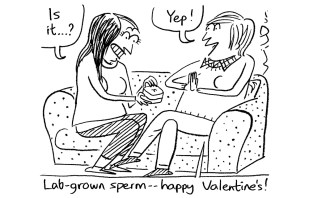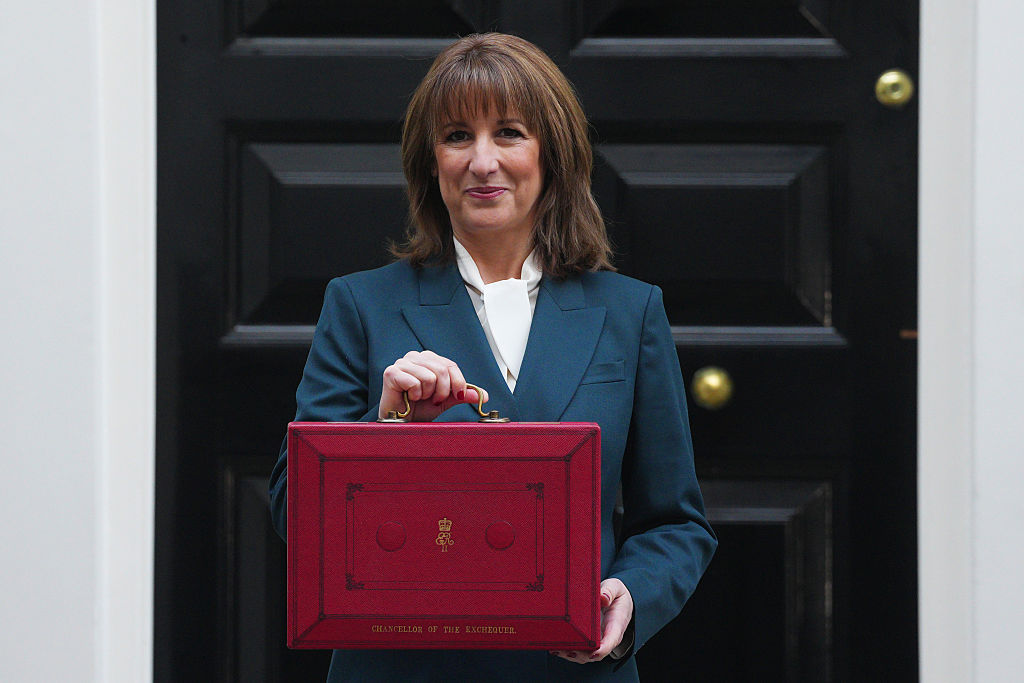
I was a twin when I was born, but this was in the days before decent scans and proper neonatal intensive care, and we were more than two months premature, so not long afterwards, my twin died. As a child, I thought nothing of it. It simply wasn’t relevant. But when I was drifting around America in my early twenties, the subject came up one day in conversation. A Texan friend asked me: ‘Do you miss your twin?’ I turned to her, meaning to laugh at the daft question, but instead, embarrassingly, I cried. And I’ve known ever since, whether I like it or not – and I really don’t, actually, because it sounds so sappy – that we form emotional ties in the womb, and that when they’re severed, we feelthe loss. And I’m afraid this makes me completely, icily determined that we should not just casually relax the laws around surrogacy, as the Law Commission proposes, and the government seems set to do.
I don’t mean that no one should ever carry a child for anyone else. We allow altruistic surrogacy here, and the payment of limited expenses to the birth mother. But the proposals – presented as a long-overdue overhaul of a cruel and outdated system – would put Britain on the road to American-style commercial surrogacy. ‘Commissioning parents’ would be able to pay more, and so the agencies would emerge, summoned by the smell of cash, trawling through Eastern Europe in search of cheap wombs to rent. This is actually the aim – there’s increasing demand for surrogate babies, says the Law Commission, and it’s a disgrace that supply falls short.
‘By introducing a new regulatory route… we can ensure that we have an effective regime for surrogacy agreements that places the interests of the child at their heart,’ says Professor Nick Hopkins, family law commissioner. The interests of the child? Professor Nick is asking us to pretend that nothing much is lost when a baby is taken from the mother who gave birth to him, and that’s just untrue. If there’s still a sense of loss ghosting around my system from the death of my twin, how much more must there be in every child that’s been taken from his mother? We can live with loss. Everyone lives with loss. But it’s strange and wrong to pretend it isn’t there.
We can try to be in denial about the fact that both babies and the surrogates they’re taken from suffer, but we know it’s true. We can’t not know. In the two decades since my tearful outburst, there’s been a huge amount discovered about the bond between unborn babies and their mothers. We know that a baby in the womb recognises and responds to his mother’s voice, and that the sound has a magical effect on him after birth, soothing his nervous system and easing stress.
The more you treat a baby like a purchase, the more parents will act like purchasers
We know about the peculiar business of microchimerism in which a baby and his mother swap cells during gestation. There are cells containing my son’s Y chromosomes roaming about in my body, and because we shared a womb, I contain my twin’s Y chromosomes too. There’s actually speculation among scientists that these roaming cells might change the mother’s behaviour: bend her attention and her emotions towards her newborn. Do the surrogate agencies tell their poor young recruits that cells from the babies they carry will live inside them for ever, changing them in unknown ways? I don’t expect they do.
The Kardashian sisters, keen purchasers of surrogacy services, are at least honest about it. Khloe Kardashian, who paid a surrogate to have her son Tatum, has admitted that it was hard to bond with him as a result: ‘I wasn’t carrying him, I didn’t really feel anything.’
The actress Lily Collins announced last week that she’d also had a baby via a surrogate, and she got it in the neck because people presumed she’d done it to stay svelte for some sexy role. Perhaps Lily shouldn’t be persecuted, but people had a point. The fashion for surrogacy is growing fast among influencers and movie stars who don’t fancy the slog of getting back into shape. And celebs have started posing for photos in hospital beds with their surrogate babies held tight to their chests, as if they’ve just given birth themselves. The birth mother is airbrushed out of the picture like a Stalin apparatchik. Helen Gibson, founder of an excellent outfit, Surrogacy Concern, says that surrogate mothers are referred to in increasingly derogatory terms, not just as ‘gestational carriers’ but as ‘ovens’, or sometimes ‘the microwave’.
The doublethink is eye-watering. In the normal run of things, we’re told it’s vital to talk to ‘baby’ in the womb and to breastfeed no matter what, for the sake of his health. So why, when it comes to surrogacy, is it the ‘commissioning parents’ who come first? Surrogates are encouraged to hand the baby over quick-sharp, so that the purchasing parents don’t feel left out. It’s kinder anyway not to let the bond form between surrogate and baby, they say – but it already formed long ago.

As the law stands in this country, the woman who’s given birth is the baby’s legal mother for the first six weeks of a child’s life. The proposed change would transfer legal responsibility for the child to the paying parent at the moment of birth. Brutally, this would remain the case even if the gestational mother had also given her egg and grown her own genetic child. Can this really be in the interests of the child, or is it intended simply to offer reassurance to paying parents that there’s no risk attached to their purchase – to grow the market?
But beware. The more you treat a baby like a purchase, the more parents will behave like purchasers. One Australian couple were accused of leaving one of their twins behind in India after a surrogate birth because they ‘already had’ a child of the same gender and didn’t want another. Another Australian couple had twins via a Thai surrogate, but took only the girl home because her brother had Down’s syndrome and they hadn’t ordered one of those. The happy ending here is that the surrogate, the ‘oven’, loved him, and took him in and raised him as her own.
What’s the truth behind surrogacy? Mary Wakefield discusses alongside Sunshine Hanson, founder of US-based surrogacy agency Surrogacy Is…:









Comments